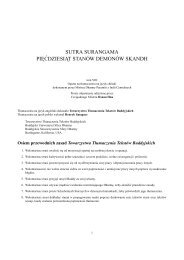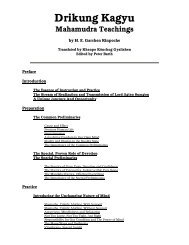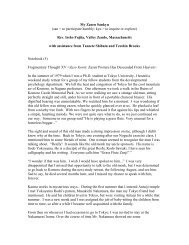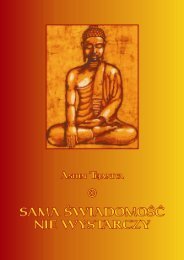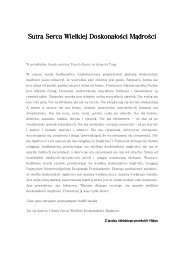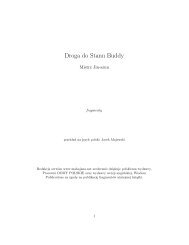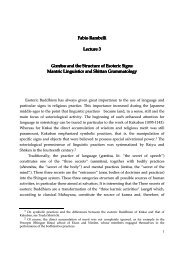- Page 5: TO THE DEAR MEMORYOFMY BELOVED MOTH
- Page 8 and 9: VIPagePart IL —The Sensible World
- Page 10 and 11: VIIIPageg) The Causal and Hypotheti
- Page 12 and 13: ABBREVIATIONSAnekSntaj. Anekanta-ja
- Page 16 and 17: VaiSesika
- Page 24 and 25: NirvaNa,Svatantrika
- Page 26 and 27: 12 BUDDHIST LOGICby two great men,
- Page 28 and 29: 14 BUDDHIST LOGICgreatest men of th
- Page 30: Nirvana
- Page 34: 20 BUDDHIST LOGICThe Sankhya system
- Page 37 and 38: INTBODUCTION 23which our speech con
- Page 39 and 40: INTBODUCTION 2 5external world corr
- Page 41 and 42: INTRODUCTION 2 7blems. The Buddhist
- Page 43 and 44: INTRODUCTION 29or followed the habi
- Page 45 and 46: INTRODUCTION 31and criticized as su
- Page 47 and 48: INTRODUCTION 33just as he dissented
- Page 49 and 50: INTRODUCTION 35He died in Kalinga i
- Page 51 and 52: INTRODUCTION 37§ 10. THE WOEKS OF
- Page 53 and 54: INTRODUCTION 39rence from syllogism
- Page 55 and 56: INTRODUCTION 41esteem by the Tibeta
- Page 57 and 58: INTRODUCTION 43differed radically i
- Page 59 and 60: INTRODUCTION 45Jnanasirt, but the f
- Page 61 and 62: INTRODUCTION 473s^ Sub-commentary b
- Page 63 and 64: INTRODUCTION 4 9Souls, all Universa
- Page 65 and 66:
INTEODTTCTION 51of view. These conc
- Page 67 and 68:
INTBODUCTION 5 3This new logic was
- Page 69 and 70:
INTKODUCTION 55In the next century
- Page 71 and 72:
INTBODUCTION 57and introduce the co
- Page 73 and 74:
PART I.REALITY AND KNOWLEDGE,(prama
- Page 75 and 76:
BEALITY AND KNOWLEDGE 61inferences
- Page 77 and 78:
CandrakirtiNyaya-Naiyayikas,
- Page 79 and 80:
BEALITY AND KNOWLEDGE 65such causes
- Page 81 and 82:
BEALITY AND KNOWLEDGE 67that every
- Page 83 and 84:
EEALITY AND KNOWLEDGE 69is only an
- Page 85 and 86:
REALITY AND KNOWLEDGE 71Wherever th
- Page 87 and 88:
BEALITY AND KNOWLEDGE 73different s
- Page 89 and 90:
BEALITY AND KNOWLEDGE 75in India, j
- Page 91 and 92:
EEALITY AND KNOWLEDGE / /from sheer
- Page 93 and 94:
PART II.THE SENSIBLE WORLD.CHAPTER
- Page 95 and 96:
THE THEOBY OP INSTANTANEOUS BEING 8
- Page 97 and 98:
THE THEORY OF INSTANTANEOUS BEING 8
- Page 99 and 100:
THE THEOBY OP INSTANTANEOUS BEING 8
- Page 101 and 102:
THE THEORY OF INSTANTANEOUS BEING 8
- Page 103 and 104:
THE THEOBY OF INSTANTANEOUS BEING 8
- Page 105 and 106:
THE THEORY OF INSTANTANEOUS BEING 9
- Page 107 and 108:
THE THEORY OF INSTANTANEOUS BEING 9
- Page 109 and 110:
THE THEORY OF INSTANTANEOUS BEING 9
- Page 111 and 112:
THE THEOEY OF INSTANTANEOUS BEIN0 9
- Page 113 and 114:
THE THEORY OF INSTANTANEOUS BEING 9
- Page 115 and 116:
THE THEORY OF INSTANTANEOUS BEING 1
- Page 117 and 118:
THE THEORY OF INSTANTANEOUS BEING 1
- Page 119 and 120:
THE THEOBY OF INSTANTANEOUS BEING 1
- Page 121 and 122:
THE THEOEY OF INSTANTANEOUS BEING 1
- Page 123 and 124:
THE THEOKY OF INSTANTANEOUS BEING 1
- Page 125 and 126:
THE THEORY OF INSTANTANEOUS BEING 1
- Page 127 and 128:
THE THEOBY OF INSTANTANEOUS BEING 1
- Page 129 and 130:
THE THEOBY OF INSTANTANEOUS BEING 1
- Page 131 and 132:
THE XHEOEY OF INSTANTANEOUS BEING 1
- Page 133 and 134:
CAUSATION 119CHAPTER II.CAUSATION(P
- Page 135 and 136:
CAUSATION 121a tight embracement by
- Page 137 and 138:
CAUSATION 123It is clear that this
- Page 139 and 140:
CAUSATION 125means that to be real
- Page 141 and 142:
CAUSATION 127There are thus two cau
- Page 143 and 144:
CAUSATION 129instead of explaining
- Page 145 and 146:
CAUSATION 131event». That is to sa
- Page 147 and 148:
CAUSATION 133characterized in all i
- Page 149 and 150:
CAUSATION 135measure in which they
- Page 151 and 152:
CAUSATION 137No one there is who as
- Page 153 and 154:
CAUSATION 139but later on, under th
- Page 155 and 156:
CAUSATION 141The meaning of the ter
- Page 157 and 158:
CAUSATION 143acceptance of a double
- Page 159 and 160:
CAUSATION 145it must have been for
- Page 161 and 162:
SENSE-PEBCEPTION 147our conceptual
- Page 163 and 164:
SENSE-PERCEPTION 149every cognition
- Page 165 and 166:
SENSE-PERCEPTION 151is something qu
- Page 167 and 168:
SENSE-PERCEPTION 153Dignaga quotes
- Page 169 and 170:
SENSE-PEKCEPTION 155transfer us int
- Page 171 and 172:
SENSE-PERCEPTION 157cognition that
- Page 173 and 174:
SENSE-PEKCEPTION 159distinguished f
- Page 175 and 176:
SENSE-PERCEPTION 161only way of dir
- Page 177 and 178:
SENSE-PERCEPTION 163c) Introspectio
- Page 179 and 180:
SENSE-PERCEPTION 165inner sense, 1
- Page 181 and 182:
SENSE-PEE CEPTION 167«In every cas
- Page 183 and 184:
SENSE-PERCEPTION 1 6 9by its very e
- Page 185 and 186:
SENSE-PERCEPTION 171of a special st
- Page 187 and 188:
SENSE-PEKCEPTION 173According to th
- Page 189 and 190:
SENSE-PERCEPTION 175criticized by D
- Page 191 and 192:
SENSE-PEKCEPTION 177make any suffic
- Page 193 and 194:
SENSE-PERCEPTION 179conception, and
- Page 195 and 196:
ULTIMATE EEALITY 181CHAPTER IV.ULTI
- Page 197 and 198:
ULTIMATE REALITY 13313) it is non-e
- Page 199 and 200:
ULTIMATE BEAUTY 185ral essence, 1 t
- Page 201 and 202:
ULTIMATE BEALITY- 1S7ratio to the d
- Page 203 and 204:
ULTIMATE REALITY 183The vagueness i
- Page 205 and 206:
ULTIMATE REALITY 191translucent. Ev
- Page 207 and 208:
ULTIMATE REALITY 193affirmation ana
- Page 209 and 210:
ULTIMATE REALITY 195A Jain philosop
- Page 211 and 212:
ULTIMATE REALITY 197existence, the
- Page 213 and 214:
ULTIMATE BEALITY 199have seen, is q
- Page 215 and 216:
ULTIMATE REALITY 201which is not ul
- Page 217 and 218:
ULTIMATE BEALITY2OSthe ultimately s
- Page 219 and 220:
JUDGMENT 205if we like, also call a
- Page 221 and 222:
JUDGMENT 207spection. l But the mom
- Page 223 and 224:
JUDGMENT 209The moment of intelligi
- Page 225 and 226:
JUDGMENT 211stroke to each pot and
- Page 227 and 228:
JUDGMENT 213as, e. g., of the moon
- Page 229 and 230:
JUDGMENT 215stopping 1 at some of t
- Page 231 and 232:
JUDGMENT 217The categories of the B
- Page 233 and 234:
JUDGMENT 219We will find them, or t
- Page 235 and 236:
JUDGMENT 221what is external and si
- Page 237 and 238:
JUDGMENT 223is affirmed with full c
- Page 239 and 240:
JUDGMENT 225In Mahayana the theory
- Page 241 and 242:
JUDGMENT 227course consists in a de
- Page 243 and 244:
JUDGMENT 229distinction, says J. S.
- Page 245 and 246:
INFERENCE 231CHAPTER II.INFERENCE.
- Page 247 and 248:
INFERENCE 233a combination of them,
- Page 249 and 250:
INFERENCE 235quality of the subject
- Page 251 and 252:
INFEEENCE 237would have been cogniz
- Page 253 and 254:
INFERENCE 239of the Mark as present
- Page 255 and 256:
INFERENCE 241resort to imagination
- Page 257 and 258:
INFEBBNCE 243similar and disagreeme
- Page 259 and 260:
INFERENCE 2452. In Similar only.3.
- Page 261 and 262:
INFEBENCE 247Dharmakirti attached s
- Page 263 and 264:
INFERENCE 249There is no third poss
- Page 265 and 266:
INFERENCE 251Strictly speaking both
- Page 267 and 268:
INFERENCE 253We shall thus have two
- Page 269 and 270:
INFERENCE 255different varieties of
- Page 271 and 272:
INFERENCE 257or, if the objective r
- Page 273 and 274:
INFERENCE 259the other only when th
- Page 275 and 276:
INFERENCE 261fore in safety against
- Page 277 and 278:
INFERENCE 263although they are inde
- Page 279 and 280:
INFERENCE 265perception nor inferen
- Page 281 and 282:
INFERENCE 267establish a relation o
- Page 283 and 284:
INFERENCE 269§ 16. SOME EUROPEAN P
- Page 285 and 286:
INFERENCE 271Remains the problem of
- Page 287 and 288:
INFEBENCE 273analytical in the sens
- Page 289 and 290:
SYLLOGISM . 275CHAPTER III.SYLLOGIS
- Page 291 and 292:
SYLLOGISM 277Inference for one self
- Page 293 and 294:
SYLLOGISM 279and 2) is the Middle d
- Page 295 and 296:
SYLLOGISM 281degree, as the major p
- Page 297 and 298:
SYLLOGISM 283and its absence from a
- Page 299 and 300:
SYLLOGISM 285An analytical deductio
- Page 301 and 302:
SYLLOGISM 287ipsvus, the other to t
- Page 303 and 304:
SYLLOGISM 289therefore stated that
- Page 305 and 306:
SYLLOGISM 291He envisaged inference
- Page 307 and 308:
SYLLOGISM 293the example of the Vai
- Page 309 and 310:
SYLLOGISM 295Buddhism, and all thin
- Page 311 and 312:
SYLLOGISM 297proposition necessaril
- Page 313 and 314:
SYLLOGISM 299Induction. Aristotle d
- Page 315 and 316:
SYLLOGISM 301as the Hindus say, wil
- Page 317 and 318:
SYLLOGISM 303not be reversed. The s
- Page 319 and 320:
SYLLOGISM 305and one of the moods o
- Page 321 and 322:
SYLLOGISM 307in the first. Dharmott
- Page 323 and 324:
SYLLOGISM 309calls the Aristotelian
- Page 325 and 326:
SYLLOGISM 311In this sense the logi
- Page 327 and 328:
SYLLOGISM 313the effect, or the maj
- Page 329 and 330:
SYLLOGISM 315Where there never is f
- Page 331 and 332:
SYLLOGISM 317principles of Identity
- Page 333 and 334:
SYLLOGISM 319than Causality (betwee
- Page 335 and 336:
LOGICAL FALLACIES 321of fallacies a
- Page 337 and 338:
*16F\\\ „635 3a ^ ^/O / * -\/oyer
- Page 339 and 340:
LOGICAL FALLACIES 325other interdep
- Page 341 and 342:
LOGICAL FALLACIES 3271. When P is r
- Page 343 and 344:
LOGICAL FALLACIES 329minor term, wi
- Page 345 and 346:
LOGICAL FALLACIES 331contradictoril
- Page 347 and 348:
LOGICAL FALLACIES 333Above and bene
- Page 349 and 350:
LOGICAL FALLACIES 335included. If w
- Page 351 and 352:
LOGICAL FALLACIES 337presence of th
- Page 353 and 354:
LOGICAL FALLACIES 339its absence in
- Page 355:
LOGICAL FALLACIES 3414) abandoning
- Page 358 and 359:
344 BUDDHIST LOGICcan always be don
- Page 360 and 361:
346 BUDDHIST LOGICtell, since there
- Page 362 and 363:
348 BUDDHIST LOGICone another, doub
- Page 364 and 365:
350 BUDDHIST LOGICthese realistic s
- Page 366 and 367:
352 BUDDHIST LOGICnaive reader by a
- Page 368 and 369:
354 BUDDHIST LOGICillogical and new
- Page 370 and 371:
356 BUDDHIST LOGICnon-linguistic, e
- Page 372 and 373:
358 BUDDHIST LOGICthe real connecti
- Page 374 and 375:
360 BUDDHIST LOGICdependence of the
- Page 376 and 377:
362 BUDDHIST LOGICthen only be eith
- Page 378 and 379:
364 BUDDHIST LOGICalways the work o
- Page 380 and 381:
366 BUBDHIST LOGICThus a fancied pe
- Page 382 and 383:
368 BUDDHIST LOGICBuddhists Non-exi
- Page 384 and 385:
370 BUDDHIST LOGIC§ 3. THE FIGUBES
- Page 386 and 387:
372 BUDDHIST LOGICConclusion. On th
- Page 388 and 389:
374 BUDDHIST LOGICof the object, wh
- Page 390 and 391:
376 BUDDHIST LOGICMajor premise. Wh
- Page 392 and 393:
378 BUDDHIST LOGICsense?, this figu
- Page 394 and 395:
380 BUDDHIST LOGICopposed to the fa
- Page 396 and 397:
382 BUDDHIST LOGICand its cognition
- Page 398 and 399:
384 BUDDHIST LOGICis established wh
- Page 400 and 401:
386 BUDDHIST LOGICis incognizable i
- Page 402 and 403:
388 BUDDHIST LOGICand non-existence
- Page 404 and 405:
390 BUDDHIST LOGICScholastic Vedant
- Page 406 and 407:
392 BUDDHIST LOGICThat this is real
- Page 408 and 409:
394 BUDDHIST LOGICEns, the Hoc-Aliq
- Page 410 and 411:
396 BUDDHIST LOGICBut although it i
- Page 412 and 413:
398 BUDDHIST LOGIChut Brentano and
- Page 414 and 415:
BUDDHIST LOGICCHAPTER II.THE LAW OF
- Page 416 and 417:
402 BUDDHIST LOGICsomething incompa
- Page 418 and 419:
404 BUDDHIST LOGICof Excluded Middl
- Page 420 and 421:
406 BUDDHIST LOGICthe following par
- Page 422 and 423:
408 BUDDHIST LOGICbut only to const
- Page 424 and 425:
410 BUDDHIST LOGICFor Instantaneoun
- Page 426 and 427:
412 BUDDHIST LOGICA thing possessin
- Page 428 and 429:
414 BUDDHIST LOGICwas in this respe
- Page 430 and 431:
416 BUDDHIST LOGICThemselves, which
- Page 432 and 433:
418 BUDDHIST LOGICDouble Negation n
- Page 434 and 435:
420 BUDDHIST LOGICthere is absolute
- Page 436 and 437:
422 BUDDHIST LOGICWe have seen that
- Page 438 and 439:
424 BUDDHIST LOGICthat it can be ad
- Page 440 and 441:
426 BUDDHIST LOGICmuch more akin to
- Page 442 and 443:
428 BUDDHIST LOGICnon-existent, ind
- Page 444 and 445:
430 BUDDHIST LOGIC« There are in t
- Page 446 and 447:
432 BUDDHIST LOGICEns does not exis
- Page 448 and 449:
434 BUDDHIST LOGICAn idea «in itse
- Page 450 and 451:
436 BUDDHIST LOGICthe Aristotelian
- Page 452 and 453:
438 BUDDHIST LOGICHe therefore conv
- Page 454 and 455:
440 BUDDHIST LOGICdifferent. It is
- Page 456 and 457:
442 BUDDHIST LOGICBut the Buddhist
- Page 458 and 459:
444 BUDDHIST LOGICCHAPTER III.UNIVE
- Page 460 and 461:
446 BUDDHIST LOGICsubstances! But n
- Page 462 and 463:
448 BUDDHIST LOGICWe see that the a
- Page 464 and 465:
450 BUDDHIST LOGICSince all things
- Page 466 and 467:
452 BUDDHIST LOGICvidual it somehow
- Page 468 and 469:
454 BTJDDHIBT LOGICsuggests to the
- Page 470 and 471:
456 BUDDHIST LOGICto the reality of
- Page 472 and 473:
458 BUDDHIST LOGICWhat is indeed th
- Page 474 and 475:
460 BUDDHIST LOGICaffirmation, «pu
- Page 476 and 477:
462 BUDDHIST LOGIC(Jinendrabuddhi,
- Page 478 and 479:
464 BUDDHIST LOGICstood as the dire
- Page 480 and 481:
466 BUDDHIST LOGICtion) of repudiat
- Page 482 and 483:
468 BUDDHIST LOGICfrom its varietie
- Page 484 and 485:
470 BUDDHIST LOGICd) The experience
- Page 486 and 487:
472 BUDDHIST LOGIC(316. 25). ((Nega
- Page 488 and 489:
474 BUDDHIST LOGICSimple Negation m
- Page 490 and 491:
476 BUDDHIST LOGICalone). They have
- Page 492 and 493:
478 BUDDHIST LOGICment of some of t
- Page 494 and 495:
480 BUDDHIST LOGICexist some common
- Page 496 and 497:
482 BUDDHIST LOGICness. E. g., inst
- Page 498 and 499:
484 BUDDHIST LOGICand the Indians.
- Page 500 and 501:
486 BUDDHIST LOGICsensation just as
- Page 502 and 503:
488 BUDDHIST LOGICled «privative^;
- Page 504 and 505:
490 BUDDHIST LOGICthoroughly invest
- Page 506 and 507:
492 BUDDHIST LOGICat the same time
- Page 508 and 509:
494 BUDDHIST LOGIC10) This direct a
- Page 510 and 511:
496 BUDDHIST LOGICall? Was Sigwart
- Page 512 and 513:
498 BUDDHIST LOGICwith affirmation.
- Page 514 and 515:
500 BUDDHIST LOGICamazing in the hi
- Page 516 and 517:
502 BUDDHIST LOGICProfessor Ulrici'
- Page 518 and 519:
504 BUDDHIST LOGICFrom the summary
- Page 520 and 521:
506 BUDDHIST LOGICPART VREALITY OF
- Page 522 and 523:
508 BUDDHIST LOGICto reality. The f
- Page 524 and 525:
510 BUDDHICT LOGIC§ 4. CBITICAL RE
- Page 526 and 527:
512 BUDDHIST LOGICfrom other things
- Page 528 and 529:
514 BUDDHIST LOGICledge should aban
- Page 530 and 531:
516 BUDDHIST LOGICits real Elements
- Page 532 and 533:
518 BUDDHIST LOGICrial object is ne
- Page 534 and 535:
520 BUDDHIST LOGICand appearing to
- Page 536 and 537:
522 BUDDHIST LOGICmust exist, and t
- Page 538 and 539:
524 BUDDHIST LOGICboth see two real
- Page 540 and 541:
526 BUDDHIST LOGICis very subtle an
- Page 542 and 543:
528 BUDDHIST LOGICis contained in t
- Page 544 and 545:
530 BUDDHIST LOGICthan anything can
- Page 546 and 547:
532 BUDDHIST LOGICtual judgment. 1
- Page 548 and 549:
534 BUDDHIST LOGIC5) The ultimate r
- Page 550 and 551:
536 BUDDHIST LOGICand cognition is
- Page 552 and 553:
538 BUDDHIST LOGICor illumined, in
- Page 554 and 555:
540 BUDDHIST LOGICBuddhist. You nee
- Page 556 and 557:
542 BUDDHIST LOGICd) Fourth Convers
- Page 558 and 559:
544 BUDDHIST LOGICneous. We call it
- Page 560 and 561:
546 BUDDHIST LOGICis expressed in t
- Page 562 and 563:
NyAya-kanika,NyAya-praveSa, ^PaNcap
- Page 564 and 565:
550 INDEX OF PROPER NAMESJacobi, F.
- Page 566 and 567:
INDEX OF MAIN LOGICAL TOPICSAnalyti
- Page 568 and 569:
554 INDEX OF MAIN LOGICAL TOPICS(he
- Page 570 and 571:
556 INDEX OP MAIN LOGICAL TOPICSnec
- Page 572 and 573:
558 APPENDIXAPPENDIX.Professor Ui i
- Page 574:
560 ADDENDA ET CORRIGENDAPage214217



![Shushogi, Dogen Zenji [PDF] - Mahajana.net](https://img.yumpu.com/50921105/1/190x219/shushogi-dogen-zenji-pdf-mahajananet.jpg?quality=85)

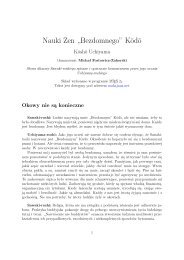
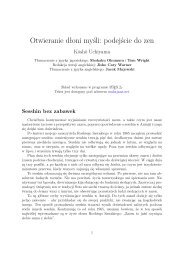
![wywiadu z Murakami Kosho Roshim [PDF] - Buddyzm w Polsce i na ...](https://img.yumpu.com/45809746/1/184x260/wywiadu-z-murakami-kosho-roshim-pdf-buddyzm-w-polsce-i-na-.jpg?quality=85)


